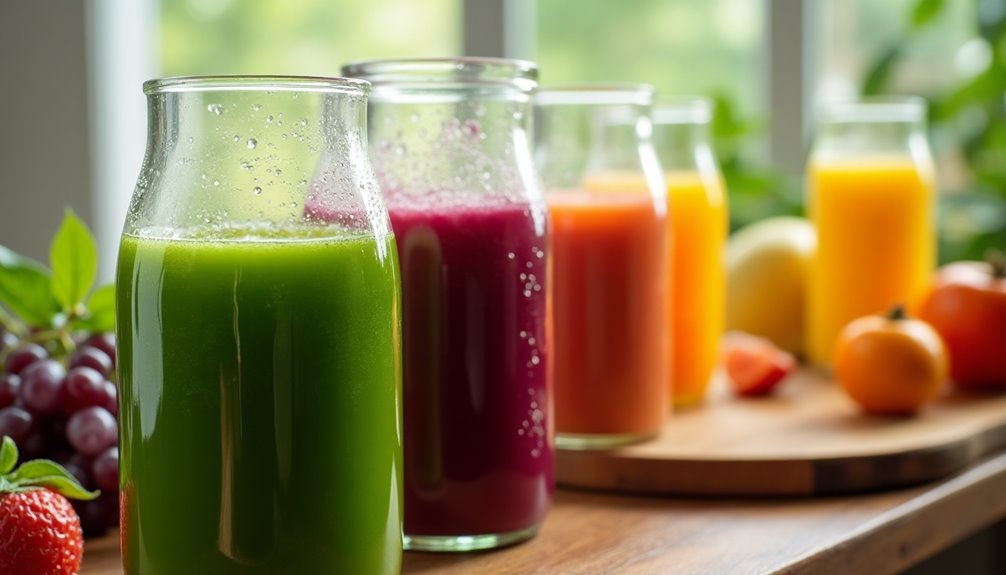Cold-pressed juice lasts about 3 to 5 days in your refrigerator if stored properly. Vegetable-based juices tend to last longer because they have lower sugar content. If you want to extend the shelf life, consider freezing the juice, which can keep it good for 6 to 12 months. Just remember to use airtight containers. To maximize its taste and nutritional value, it's essential to know how to store it effectively and watch for spoilage signs.
Key Takeaways
- Raw cold-pressed juice lasts about 3 to 5 days in the refrigerator under proper storage conditions.
- Freezing cold-pressed juice can extend its shelf life to 6 to 12 months.
- Vegetable-based juices generally last longer than fruit juices due to lower sugar content.
- Unrefrigerated juice should be consumed within 8 hours to maintain freshness and nutritional benefits.
- Signs of spoilage include separation, discoloration, and strong odors; discard if any are present.

How long can you really expect your cold-pressed juice to last? When it comes to cold-pressed juices, the juice shelf life is something you should definitely consider. Typically, you can expect your raw cold-pressed juice to last about 3 to 5 days when stored in the refrigerator under proper storage conditions. This timeframe applies to most cold-pressed juices, but it's important to note that some factors can influence how long your juice stays fresh.
For instance, if you're dealing with vegetable-based juices, you're in luck! These tend to last longer than their fruit juice counterparts. The reason lies in their lower sugar content and higher acidity, which naturally help preserve them.
On the flip side, fruit juices, with their higher sugar content, may spoil quicker. So, if you're a fan of green juices, you might find that they can still deliver that fresh taste and nutritional value a bit longer than those vibrant fruit blends.
Now, if you want to extend the life of your cold-pressed juice even further, freezing it's a great option. When kept in airtight containers, you can store your juice in the freezer for 6 to 12 months. However, keep in mind that while freezing slows down spoilage, the juice's flavor and nutritional profile may still change over time.
If you're serious about making the most out of your juice, check its expiration date, and try to consume it within the suggested timeframe.
It's also worth mentioning that if you leave your cold-pressed juice unrefrigerated, you should drink it within 8 hours. After that, the vitamin C levels can decline rapidly, meaning you're not getting the full health benefits you might expect. Staying aware of these factors can help you enjoy your juice at its peak quality.
As you enjoy your cold-pressed juices, always be on the lookout for signs of spoilage. Separation, discoloration, and any strong fermented odors are clear indicators that the juice is no longer safe to consume.
If you notice any of these signs, it's best to err on the side of caution and discard it.
Frequently Asked Questions
How Long Can Pressed Juice Stay in the Fridge?
Pressed juice can stay in the fridge for about 3-5 days if you store it properly.
Keep it at a temperature between 34-40°F (1-4°C) in a sealed container to maintain its freshness.
Vegetable-based juices usually last longer than fruit-based ones since they've less sugar.
To enjoy the best flavor and nutritional value, try to drink it within 2 days, as it starts losing quality after that.
Can I Drink Pressed Juice After a Week?
Imagine a wilting flower—beautiful once, but now losing its vibrancy. That's pressed juice after a week.
You shouldn't drink it; the quality and nutrients diminish significantly after just a few days.
Even if it seems okay, look for signs of spoilage like separation or off odors. Trust your senses!
If it's past the week mark, it's best to discard it to avoid any potential health risks.
Stay safe!
How Long Do Press Drinks Last?
When you're considering how long pressed drinks last, it really depends on how you store them.
In the fridge, they typically stay fresh for 3-5 days. If you freeze them, they can last 6-12 months, as long as you use airtight containers.
Be mindful of signs of spoilage like separation or off smells—if you notice these, it's best to toss the juice for safety.
Always prioritize freshness for the best taste!
How Long Are Squeezed Juices Good For?
When you make squeezed juices, you'll want to enjoy them at their best.
Freshly squeezed juices are good for about 8 hours if they're left unrefrigerated, but if you store them properly in the fridge, they can last 3-5 days.
If you freeze them in airtight containers, they can even last 6-12 months.
Just watch for signs of spoilage, like separation or off smells, and discard any juice that doesn't seem right.
Conclusion
In the world of fresh pressed juice, time is a delicate dance. While you can enjoy your juice for up to 72 hours when stored properly in the fridge, its vibrant flavors and nutrients start to fade after that. To savor every sip, consume it as soon as possible. Think of your juice as a fleeting sunset—beautiful and best appreciated in its prime. So, don’t let it linger; drink up and relish the freshness! Additionally, the key to maximizing the longevity of your fresh juice lies in proper storage techniques. Always use an airtight container and keep it away from light to preserve its vibrant colors and essential nutrients. If you’re ever wondering, “how long does fresh juice last? ” remember that each passing hour weakens the essence of your freshly pressed creation, urging you to enjoy it without delay for the ultimate taste experience.
Cindy thoroughly researches juicing trends, techniques, and recipes to provide readers with practical advice and inspiration. Her writing style is accessible, engaging, and designed to make complex concepts easy to understand. Cindy’s dedication to promoting the advantages of juicing shines through her work, empowering readers to make positive changes in their lives through the simple act of juicing.











